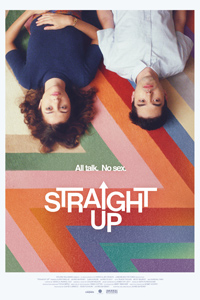Is It Gonna Be You and Me Forever?: Sweeney Sparks Romance in Loquacious Debut
 James Sweeney makes his directorial debut with Straight Up, an odd-couple romantic comedy exploring sexual orientation and gender identity in intriguing ways. An impressively performed exercise thanks to Sweeney and his lead Katie Findlay, what serves as a conversation piece capsizes underneath the weight of its overtly twee stylization thanks to rapid fire, ceaseless staccato dialogue inspired by its textual references to “The Gilmore Girls.” A fine supporting cast, which includes Tracie Thoms as an amused therapist, assists in downplaying both the oft-inherent cynicism of films dealing with LGBTQ+ themes as well as the Los Angeles film industry and all its woeful attributes.
James Sweeney makes his directorial debut with Straight Up, an odd-couple romantic comedy exploring sexual orientation and gender identity in intriguing ways. An impressively performed exercise thanks to Sweeney and his lead Katie Findlay, what serves as a conversation piece capsizes underneath the weight of its overtly twee stylization thanks to rapid fire, ceaseless staccato dialogue inspired by its textual references to “The Gilmore Girls.” A fine supporting cast, which includes Tracie Thoms as an amused therapist, assists in downplaying both the oft-inherent cynicism of films dealing with LGBTQ+ themes as well as the Los Angeles film industry and all its woeful attributes.
Unable to find romance with the string of men he’s known heretofore, Todd (Sweeney) has decided it’s time to explore his heterosexual yearnings, something he’s been conditioned to believe he doesn’t have thanks to his effete presentation. But when he meets the vibrant Rory (Katie Findlay) at the library, theirs is an intellectual match made in heaven, and they embark on a loving but sexless romance. Eventually, they must decide if they can truly be a couple without physical consummation, while those around them, including Todd’s parents (Randall Park, Betsy Brandt) and his therapist (Tracie Thoms) each weigh in on the situation.
There’s much to admire from Sweeney, especially considering this is a first-time feature. Unfortunately, some of its melancholy poignancy and sharp comedic observations don’t always land as effectively as they could had Straight Up fluctuated between its highs and lows as it tends to percolate on mania. This is especially evident in its handling of Rory, who comes to the fore as the focal point almost by default, so it’s tendency to feel overly rehearsed is disappointing. However, the film’s energy and narrative strengths recall a bygone era of tempered romantic cinema of the 1970s, and one could have envisioned this as a Liza Minelli vehicle circa her The Sterile Cuckoo and Tell Me That You Love Me, Junie Moon era of romantically befuddled protagonists who were often confronted with the sad realities of sexual vs. romantic connections. Or if Woody Allen on a coke binge had ever decided to step out of his hetero comfort zone.
At the same time, Sweeney’s films speaks to a continual cultural predicament as concerns alternative sexualities or coupledom, whether it be something as classic as Harold & Maude or like the current popular flavor, the reality series “Love is Blind,” the lack of support for those who don’t adhere to one particular sexual orientation marks this as well-attenuated example of the cultural support often necessary for the success of any relationship. At the same time, it’s twist on orientation isn’t unlike similar moves frequently made in 1990s glossy rom-coms such as The Object of My Affection or Three to Tango. Undoubtedly, Sweeney is a fiercely intelligent scribe and an overtly unique screen presence with a formidable penchant for cultural references often forgotten by a zeitgeist obsessed with the here and now.
★★½/☆☆☆☆☆


